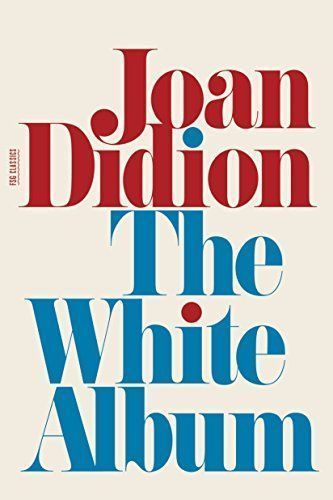
The White Album Essays
First published in 1979, The White Album records indelibly the upheavals and aftermaths of the 1960s. Examining key events, figures, and trends of the era—including Charles Manson, the Black Panthers, and the shopping mall—through the lens of her own spiritual confusion, Joan Didion helped to define mass culture as we now understand it. Written with a commanding sureness of tone and linguistic precision, The White Album is a central text of American reportage and a classic of American autobiography.
Reviews
Quentin Gibeau@xmas_gonna
Patricia K@thepoemzone
Anya Tindale@anyatindale
gingy :3@godsfavouritedear
Lindy@lindyb
annalyse! @a_nnalyse
kayley@sweetestgirl
Laura Mauler@blueskygreenstrees
Lila R E@lilaklara
woahluv@woahluv
enya@wildatheart
Elizabeth Denny@lillyjean
lauren@laureniscompletelyfine
Andrew Louis@hyfen
Midori Kobayashi@snortingpages
Nick Gracilla@ngracilla
Nick Gracilla@ngracilla
Amy Thibodeau@amythibodeau
Irem@merixien
p.@softrosemint
Lia @liafrosio
Grace M@literallygrace
Chiyeung lau@chiyeung
Arden Kowalski@jonimitchell
Highlights
louv@yunglouv
maya @mill3r
Macy HB@macyhb
Page 208
Macy HB@macyhb
Page 206
Macy HB@macyhb
Page 206
Macy HB@macyhb
Page 205
Macy HB@macyhb
Page 201
Macy HB@macyhb
Page 184
Macy HB@macyhb
Page 177
Macy HB@macyhb
Page 134
Macy HB@macyhb
Page 124
Macy HB@macyhb
Page 118
Macy HB@macyhb
Page 117
Macy HB@macyhb
Page 114
Macy HB@macyhb
Page 110
Macy HB@macyhb
Page 88
Macy HB@macyhb
Page 86
Macy HB@macyhb
Page 86
Macy HB@macyhb
Page 83
Macy HB@macyhb
Page 76
Macy HB@macyhb
Page 57
Macy HB@macyhb
Page 11
Macy HB@macyhb
Page 11
louv@yunglouv